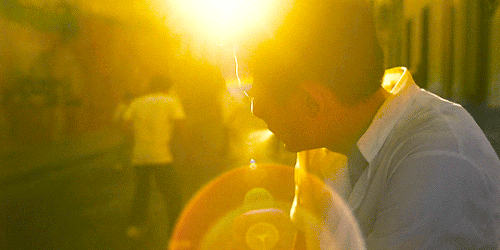We Could Start Over, 20 Years Later
Twenty years after it was first released, Happy Together is still the quintessential Chinese queer film, a dream of starting over at the end of the world. Emily Benita traces Yiu-fai and Po-wing’s acid neon steps and finds a love that transcends labels, identity and national boundaries, with lessons for today’s world.

Watching Wong Kar-wai’s Happy Together (1997) twenty years on from its initial release, and four years from when I first saw it, it is striking how little it has dated. A love story, but not one often seen, certainly not in the mid-90s: between two men, no-one dies, no-one gets married. There is nuance and specificity in the representation. Wong has insisted in many discussions about the film that he did not set out to make a ‘gay movie’ and does not see it as such. Instead, it is a love story that happens to be between two men.
Told from the perspective of Lai Yiu-fai, the film follows his tumultuous relationship with Ho Po-wing. Despite Yiu-fai’s understanding and willing to reconnect, Po-wing’s behaviour is continually erratic. It quickly emerges that their relationship is cyclical and abusive. On a last-ditch attempt to start again, they travel to Argentina, but their reconciliation is short-lived. Two strangers to the land, living in the same country but leading separate lives, their magnetic attraction - and repulsion - plays out, with Yiu-fai’s future happiness hanging in the balance.
The performances from Tony Leung Chiu-wai and the late Leslie Cheung are typical of Wong’s ability to externalise the internal battles of the human condition without resorting to hollow incident, both in the writing and direction. Yiu-fai is observant and deceptively placid, his laconic voiceover one of the best executed in cinema. The original title of the film is an idiom that does not translate well to English, but essentially means intimate skin, whilst the English title is heavy with irony. However, there is a refreshing lack of judgement on Yiu-fai’s choices to return to Po-wing inherent in the film. Instead it reveals Yiu-fai’s good natured hope that things will be better with Po-wing.

Happy Together contains that strange paradox, whereby the more specific the relationship shown, the less that it is burdened with representation, the more resonant and universal its effects and message are. Yiu-fai and Po-wing are shown more in Argentinian flamenco performances than in gay clubs. The film’s lacking of a scene or discussion of rights issues within the LGBTQ community makes it strangely progressive, precisely because the spine of the film is a man’s relationship with another man and how that reflects his own self-esteem. This isn’t to say that these issues aren’t just as vital today or aren’t worthy of discussion, but there is some respite in seeing a queer film that is about the immediate human experience of love, instead of focusing solely on a political angle.
Watching today, the most political reading of the film can be found not in the central relationship but in the cinematography. Christopher Doyle’s black-and-white flashbacks are reminiscent of the French New Wave aesthetic, whilst the acidic neon of the present captures the haze and pace of city life. However, this sheen is the same in both Argentina and Hong Kong. Wherever Yiu-fai and Po-wing are in the world, the world doesn’t look any different. In a time where politics have taken a veer towards individualism and policies of isolation, this globalisation is a welcome retort, a reminder of the unity and shared base principles of human living.
If anything, the film feels fresher now than twenty years ago. The world it depicts is one that I recognise and live in today. There is much to admire about that sense of imagination. How banality can sometimes be evidence of a long-held acceptance makes it something to be appreciated, not denigrated. It is safe to say that we can look forward to watching Happy Together again in the next 20 years, each time finding something new in this strikingly unique yet still universal love story.

Words: Emily Benita
Translation: Jack Yan
Originally written in English. Images are from the internet.
CINEMQ是一个短片展映和深夜派对的合成体,由一群异想天开的酷儿们筹划。我们将在每周发表与酷儿电影及荧幕文化相关的资讯和文章。想要投稿?请在关注我们的公众号后留言。
CINEMQ is a queer short film screening + party series. It is run by a group of queers with too much on their mind to sit still for long. We’re publishing articles on queer cinema and screen culture every week. Want to contribute? Message our account.

